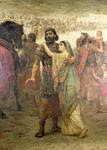Lambeth Conference - Introduction
Revived by some lunch, we met in plenary for the Introduction to the rest of the Conference. This marked a change of gear, moving on Monday into what are ‘ordinary days’, the getting down to business.
It was fascinating to hear more about the Conference Programme and especially the nature of Indaba – on which I intend to blog – as well as the Covenant Proposal and also the Windsor Report Process – this is the report on human sexuality. This last aspect began to address the issue which is never far from the surface. It seems to me to be many people’s concern that this shouldn’t be the overriding issue of the Conference, that there are other more important issues to discuss. However, the absence of 250 bishops is, as Bishop Clive Hanford, the Chair of the group responsible for the ongoing process of the report, said, ‘a symbol of division and pain’. I was impressed by his analysis of the current situation, in which he spoke of the severity of the situation; the complexity of the Anglican Communion, with competing value systems, and a lack of clarity about shared values; inconsistencies in applying the Windsor Report; the breakdown of trust which has a number of components; turmoil in The Episcopal Church; and diminishing Communion.
Concluding this session, before Evening Prayer, Archbishop Rowan gave the first Presidential Address, in which he acknowledged in his opening statement that the Conference was ‘very aware of people’s eyes upon us’. And that ‘our eyes are upon each other’. He was pointed. ‘God is asking more sharply than before, what do we want to do with the Anglican Communion?’ He made clear that the greatest need is for transformed relationships, and he provided some of the suggested options: a loose federation, a connection of national family churches, more centralisation. ‘Is there another option? There is, but it would take some change of what we take for granted.’ The option he offered as the one in which he believes the Anglican Communion is being directed consists of two elements: counsel and covenant. He’s a wise and godly man and this was good stuff – the question is how will the Conference proceed over the next two weeks? A helpful reminder was that the Conference doesn’t vote, but it does make resolutions.
I had tea with Phil Groves, who was a Team Vicar at Melton Mowbray during my ministry there. He’s the Facilitator of the Listening Process and he’s done an excellent job in editing, ‘The Anglican Communion and Homosexuality’. You can imagine what we talked about.
It was fascinating to hear more about the Conference Programme and especially the nature of Indaba – on which I intend to blog – as well as the Covenant Proposal and also the Windsor Report Process – this is the report on human sexuality. This last aspect began to address the issue which is never far from the surface. It seems to me to be many people’s concern that this shouldn’t be the overriding issue of the Conference, that there are other more important issues to discuss. However, the absence of 250 bishops is, as Bishop Clive Hanford, the Chair of the group responsible for the ongoing process of the report, said, ‘a symbol of division and pain’. I was impressed by his analysis of the current situation, in which he spoke of the severity of the situation; the complexity of the Anglican Communion, with competing value systems, and a lack of clarity about shared values; inconsistencies in applying the Windsor Report; the breakdown of trust which has a number of components; turmoil in The Episcopal Church; and diminishing Communion.
Concluding this session, before Evening Prayer, Archbishop Rowan gave the first Presidential Address, in which he acknowledged in his opening statement that the Conference was ‘very aware of people’s eyes upon us’. And that ‘our eyes are upon each other’. He was pointed. ‘God is asking more sharply than before, what do we want to do with the Anglican Communion?’ He made clear that the greatest need is for transformed relationships, and he provided some of the suggested options: a loose federation, a connection of national family churches, more centralisation. ‘Is there another option? There is, but it would take some change of what we take for granted.’ The option he offered as the one in which he believes the Anglican Communion is being directed consists of two elements: counsel and covenant. He’s a wise and godly man and this was good stuff – the question is how will the Conference proceed over the next two weeks? A helpful reminder was that the Conference doesn’t vote, but it does make resolutions.
I had tea with Phil Groves, who was a Team Vicar at Melton Mowbray during my ministry there. He’s the Facilitator of the Listening Process and he’s done an excellent job in editing, ‘The Anglican Communion and Homosexuality’. You can imagine what we talked about.


Comments